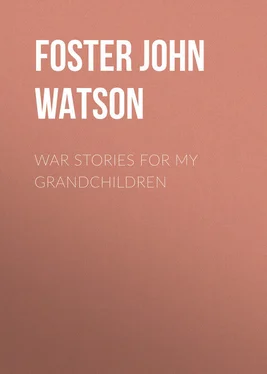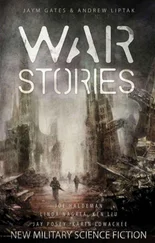John Foster - War Stories for my Grandchildren
Здесь есть возможность читать онлайн «John Foster - War Stories for my Grandchildren» — ознакомительный отрывок электронной книги совершенно бесплатно, а после прочтения отрывка купить полную версию. В некоторых случаях можно слушать аудио, скачать через торрент в формате fb2 и присутствует краткое содержание. Жанр: foreign_antique, foreign_prose, на английском языке. Описание произведения, (предисловие) а так же отзывы посетителей доступны на портале библиотеки ЛибКат.
- Название:War Stories for my Grandchildren
- Автор:
- Жанр:
- Год:неизвестен
- ISBN:нет данных
- Рейтинг книги:4 / 5. Голосов: 1
-
Избранное:Добавить в избранное
- Отзывы:
-
Ваша оценка:
- 80
- 1
- 2
- 3
- 4
- 5
War Stories for my Grandchildren: краткое содержание, описание и аннотация
Предлагаем к чтению аннотацию, описание, краткое содержание или предисловие (зависит от того, что написал сам автор книги «War Stories for my Grandchildren»). Если вы не нашли необходимую информацию о книге — напишите в комментариях, мы постараемся отыскать её.
War Stories for my Grandchildren — читать онлайн ознакомительный отрывок
Ниже представлен текст книги, разбитый по страницам. Система сохранения места последней прочитанной страницы, позволяет с удобством читать онлайн бесплатно книгу «War Stories for my Grandchildren», без необходимости каждый раз заново искать на чём Вы остановились. Поставьте закладку, и сможете в любой момент перейти на страницу, на которой закончили чтение.
Интервал:
Закладка:
John Watson Foster
War Stories for my Grandchildren
PREFACE
As they were growing up, I was frequently importuned by my grandchildren to tell them of my experiences in the Civil War for the Union; and now as the great-grandchildren are coming on, their parents are asking that these experiences be put in some permanent form, as their children may never have the opportunity to hear the narrative from me. I naturally shrink from giving general publicity to my personal experiences, especially as the field has been already so fully covered by comrades in arms; but I have consented to prepare such a narrative on condition that its circulation be confined to the family circles.
In preparing the narrative I have not thought it wise to trust to my memory of events which happened more than half a century ago; and fortunately I have at hand my many letters written to my wife, giving in detail my experiences during my entire service in the army, and while they are in some respects too intimate and confidential for general publicity, they have the merit of freedom from studied preparation and constitute an account of events as they occurred.
In this preparation I have indulged the hope that through it our children of this and coming generations may be inspired by a greater devotion to the American Union, for which their forefathers hazarded their lives and endured the hardships of war.
John W. FosterI
INTRODUCTION
After the inauguration of President Lincoln, March 4, 1861, much discussion followed in Washington and in the North, and plans were proposed respecting peaceable adjustment of the troubles occasioned by the secession of the Southern States from the Union. But the first hostile gun fired at Fort Sumter and the National flag, on April 12, put an end to all peace proposals, and solidified the North in favor of restoring and preserving the Union by force of arms. As one of our statesmen of that day expressed it, yesterday there had been difference of opinion, to-day there was unity.
When two days afterwards the President's call for seventy-five thousand volunteers for three months' service was issued, my first impulse was to respond to that call; but before any movement for enlistments could be made in our locality the quota of Indiana was filled to overflowing. I was content for several reasons to await the progress of events.
I cherished no desire for military glory, and distrusted my special fitness for the life of a soldier. In my college days I had contracted a horror of war and regarded it as the most terrible and futile of human follies. Shortly before my graduation I had delivered a public address for my literary society on peace and war, using as its title Charles Sumner's well-known oration – "The True Grandeur of Nations." I regarded myself as a peace man.
I had only recently entered upon the practice of my profession, and was ambitious to make a reputation as a lawyer. But, most serious of all, I had just established a modest home with a young wife and our first-born babe of less than a year old. It would be a terrible strain upon my affections and hopes to break these dearest of all ties for a life in the military service.
I, with the great body of the people of the North, entertained the hope that the seventy-five thousand men, who constituted the army so quickly formed, would prove sufficient for the reëstablisment of the Federal Union. But the battle of Bull Run, July 21, dispelled that delusion, and the President's call for three hundred thousand afterwards increased to five hundred thousand volunteers for three years' service indicated that a long and bloody war was in prospect. I resolved no longer to delay my entrance into that service.
Two days after that battle I wrote my wife as follows: —
"I intended to have written you a long letter last night in reply to your good one received yesterday afternoon, but I had no heart to write. The terrible and disastrous calamity to our army has made me sick. A thousand times rather would I have given my life and left you a widow and my darling child fatherless than that this defeat should have happened. I think I shall go to Indianapolis to-morrow to urge my immediate appointment in our new regiment. I want to help retrieve our lost fortune. I have no fear of our ultimate triumph."
When the President's second call for volunteers was issued, a movement was at once set on foot to organize a regiment at Evansville, my home, and the Governor of the State had intimated his intention to appoint me major of this new regiment. On August 9 my appointment as major was made. The next day I sent my wife's brother, Alexander, to Glendale, near Cincinnati, where she was visiting her mother, to notify her of the event and give her details of the situation. He bore her a letter in which I wrote: "Zan [Alexander] will explain the cause of his coming. I want to be with my wife as much as I can before I go, so you must hurry home as fast as you can … While you are a loving wife, remember to be a brave woman and your husband will love you the more."
I had gone to Glendale some time before to talk over with my wife my intention to enter the army, and she had given her consent; but when the time came for me to take the final step she seemed to hesitate and draw back. It was a terrible trial to contemplate, her solitary lot with her little babe and I away in the army. In answer to her letter I wrote: "You seem in your last letter to be about to withdraw your consent to let me go. That was the special reason of my late visit to Glendale, and I thought it was agreed. I have a very honorable and, to me, very flattering position, and in some degree removed from danger; and of course I shall, for the love I bear my wife and child, be as careful of my life as my duty will permit. The President has called for four hundred thousand men, and of that number it is my duty to be one. I regard this as important a war as that of the Revolution, the issue is the life and maintenance of the Government, and I would be ashamed of myself, and my children should be ashamed of me in after years, if I declined so honorable a position as that tendered me. Be of good courage."
In response to my call she came at once to Evansville, and soon entered into the spirit of my work in organizing and outfitting the regiment, and, as will be seen later in these pages, she remained to the close of my service my faithful and devoted supporter.
II
THE MISSOURI CAMPAIGN
The organization at Evansville became the Twenty-fifth Indiana Infantry Regiment of Volunteers. On August 22, thirteen days after its official staff was appointed, the regiment was ordered to St. Louis, Missouri. It was a notable farewell the citizens of Evansville and the surrounding country gave the regiment on its departure. The deportment of my wife I refer to in one of my first letters to her from St. Louis. I copy it at some length because it reflects the sentiments of hundreds of thousands of other soldiers: —
"I felt proud of you as my wife and loved you the more for the manner in which you acted on the departure of our regiment from Evansville. While I know that no wife loves her husband more than you do me, yet you could let me go off, for how long you know not, to brave the dangers of the battlefield, because I thought it my duty, without a murmur or reproach or entreaty. And now that I am away, I hope you will be the true woman still. You know that our separation is not harder for you to bear, surrounded by home and all its comforts, your darling child and dear mother, than it is for me deprived of all these. You must be hopeful and cheerful. I am here because duty prompts me, and you would be ashamed of me if I were not here.
"I will try to do all I can to preserve my health and so far protect myself from dangers as my duty and honor will permit. You must remember that there are tens of thousands of wives who bear the same lot as you do. It would make me very unhappy to know that you were disheartened and lamenting my absence and exposure to danger; and, on the contrary, it would lighten my trials to know that you were bearing it like a brave, true-hearted woman. I know you are my devoted wife, and I know you will act your part nobly."
Читать дальшеИнтервал:
Закладка:
Похожие книги на «War Stories for my Grandchildren»
Представляем Вашему вниманию похожие книги на «War Stories for my Grandchildren» списком для выбора. Мы отобрали схожую по названию и смыслу литературу в надежде предоставить читателям больше вариантов отыскать новые, интересные, ещё непрочитанные произведения.
Обсуждение, отзывы о книге «War Stories for my Grandchildren» и просто собственные мнения читателей. Оставьте ваши комментарии, напишите, что Вы думаете о произведении, его смысле или главных героях. Укажите что конкретно понравилось, а что нет, и почему Вы так считаете.












